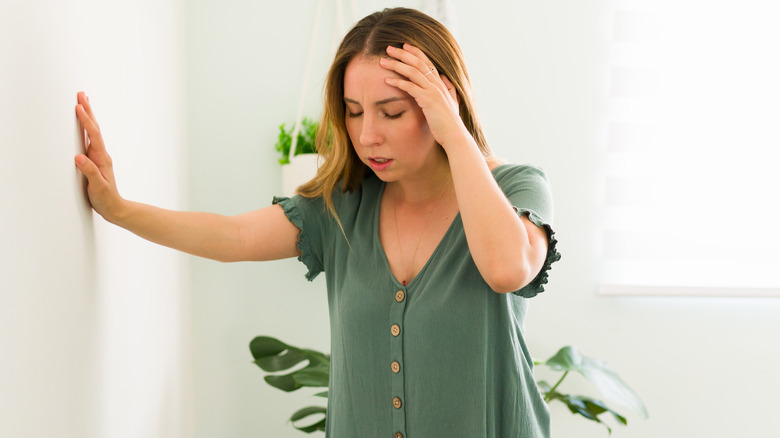What's Really Making You Dizzy When You Stand Up?
Feeling dizzy when you stand up can be caused by a number of factors. One common reason is a sudden drop in blood pressure in your brain called orthostatic hypotension, or postural hypotension (via Mayo Clinic). Jeffery Courson, a heart rhythm specialist, explains in a post for the Cleveland Clinic that when you stand up, gravity causes your blood to pool in your lower body. "Normally your body has a number of immediate responses that help protect against this drop in your blood pressure," Dr. Courson says, adding that, "If any of these responses are off or slow to happen, the result is that your blood pressure in your brain drops which causes you to feel dizzy."
To avoid feeling dizzy when standing up, Dr. Courson recommends that you don't rise from a seated or bent position too suddenly. And when getting out of bed, rather than going from a prone position immediately to standing, he suggests sitting on the side of the bed for a few seconds first. "Similarly, use caution in the morning or after prolonged periods or lying down, when getting up in the middle of the night to use the restroom, after large meals and after hot showers," Dr. Courson adds.
Ways to help prevent dizziness when you stand up
Cardiologist Dr. Christian Ruff spoke to Harvard Health Publishing and provided some additional tips that may help prevent or mitigate feelings of dizziness when standing up. If you are taking medication, for example, he suggests seeing if you can lower the dosage or stop taking the medication completely, as medications can sometime lower blood pressure. "That contributes to a remarkable number of [lightheadedness] cases that I see." He also advises that you take in more fluids. Because your blood is mostly water, if the volume of water drops overnight, this could lower your blood pressure and give you a dizzy feeling when you stand up the next morning. Dr. Ruff recommends staying hydrated throughout the day rather than drinking a lot right before bed to avoid multiple trips to the bathroom overnight.
Dr. Ruff also suggests light exercise in the morning to get the blood flowing and to avoid sitting or standing in one place for too long, which will cause blood to pool in your legs. If you feel dizzy after meals, he suggests you substitute eating smaller meals throughout the day in lieu of fewer large meals, and also cutting down on carbohydrates with refined flour, such as white bread, white rice and sugary drinks. While dizziness, or orthostatic hypotension, usually only occurs once in a while and is typically mild, if it persists or is making you feel unsafe, Dr. Ruff advises that you get an evaluation to see if you have a condition that requires treatment.


